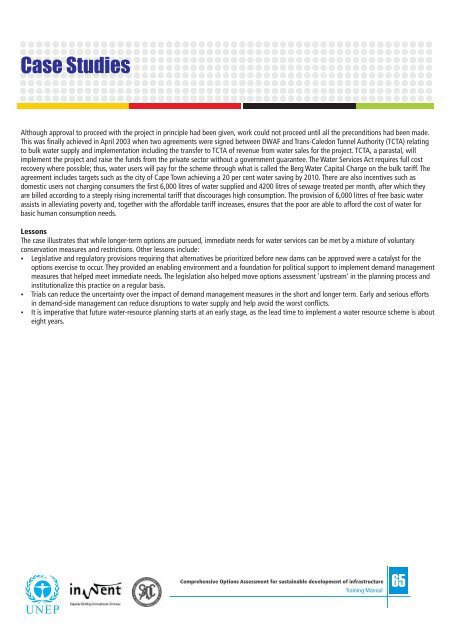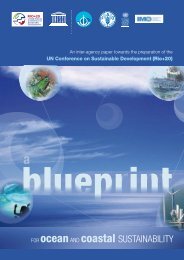Comprehensive Option Assesment - UNEP
Comprehensive Option Assesment - UNEP
Comprehensive Option Assesment - UNEP
You also want an ePaper? Increase the reach of your titles
YUMPU automatically turns print PDFs into web optimized ePapers that Google loves.
Case Studies<br />
Although approval to proceed with the project in principle had been given, work could not proceed until all the preconditions had been made.<br />
This was finally achieved in April 2003 when two agreements were signed between DWAF and Trans-Caledon Tunnel Authority (TCTA) relating<br />
to bulk water supply and implementation including the transfer to TCTA of revenue from water sales for the project. TCTA, a parastal, will<br />
implement the project and raise the funds from the private sector without a government guarantee. The Water Services Act requires full cost<br />
recovery where possible; thus, water users will pay for the scheme through what is called the Berg Water Capital Charge on the bulk tariff. The<br />
agreement includes targets such as the city of Cape Town achieving a 20 per cent water saving by 2010. There are also incentives such as<br />
domestic users not charging consumers the first 6,000 litres of water supplied and 4200 litres of sewage treated per month, after which they<br />
are billed according to a steeply rising incremental tariff that discourages high consumption. The provision of 6,000 litres of free basic water<br />
assists in alleviating poverty and, together with the affordable tariff increases, ensures that the poor are able to afford the cost of water for<br />
basic human consumption needs.<br />
Lessons<br />
The case illustrates that while longer-term options are pursued, immediate needs for water services can be met by a mixture of voluntary<br />
conservation measures and restrictions. Other lessons include:<br />
Legislative and regulatory provisions requiring that alternatives be prioritized before new dams can be approved were a catalyst for the<br />
options exercise to occur. They provided an enabling environment and a foundation for political support to implement demand management<br />
measures that helped meet immediate needs. The legislation also helped move options assessment 'upstream' in the planning process and<br />
institutionalize this practice on a regular basis.<br />
Trials can reduce the uncertainty over the impact of demand management measures in the short and longer term. Early and serious efforts<br />
in demand-side management can reduce disruptions to water supply and help avoid the worst conflicts.<br />
It is imperative that future water-resource planning starts at an early stage, as the lead time to implement a water resource scheme is about<br />
eight years.<br />
<strong>Comprehensive</strong> <strong>Option</strong>s Assessment for sustainable development of infrastructure<br />
Training Manual<br />
65
















